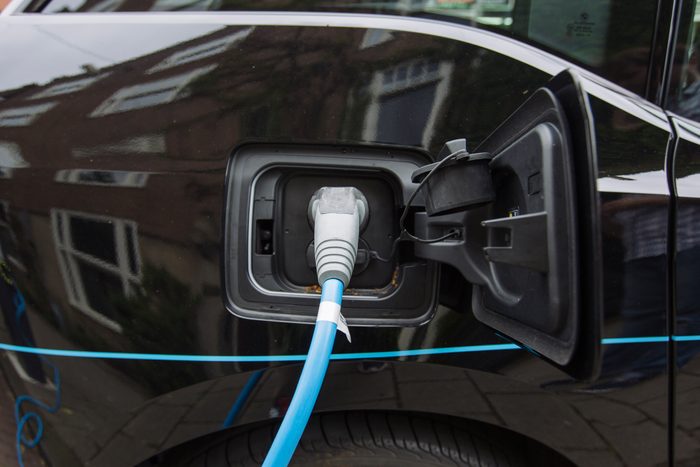How Long Do Electric Car Batteries Last?

Is that question keeping you from making the leap to electric? We've got answers!
Many years back, after spending three days at an impressive electric vehicle (EV) training and development facility, I was convinced EVs stood little chance of being anything more than niche-market vehicles. Because of battery concerns, charging issues and low miles per charge, I didn’t see a future for EVs. I never thought they would gain traction as a viable replacement for the internal combustion engine.
I was wrong. After extensively researching EVs for Family Handyman, both my opinion and attitude have done a 180-degree turnaround, especially regarding batteries. Here’s why.
On This Page
How Long Does an Electric Car Battery Last?
Much longer than you think. EV batteries are engineered to outlast the vehicle itself.
According to a life-cycle analysis by the National Renewable Energy Laboratory, depending on climate and discharging/charging cycles, EV batteries should perform reliably for 10 to 15 years.
Another study by the U.S. Department of Energy Alternative Fuels Data Center found new electric vehicle lithium-ion batteries may last between 12 and 15 years in moderate climates and eight to 12 years in extreme climates. Plus, federal regulations mandate batteries in all EVs sold in the United States come with warranties for at least eight years or 100,000 miles.
If you buy a new EV and the battery does fail, it will almost certainly be covered under the original equipment manufacturer’s (OEMs) warranty. Because EV manufacturers do not want to replace expensive EV batteries by overestimating their durability, EV battery warranties can offer some insight into the battery’s life expectancy.
How Much Do Electric Car Batteries Cost?
An EV battery replacement can range from $5,000 and $15,000, including labor.
Warranty Exclusions
Because of replacement costs, OEMs EV battery warranties may contain exclusions, but may not be limited to:
- Using a non-standard or unapproved charging station;
- Damage caused when installing non-approved aftermarket parts or accessories;
- Using the EV as a stationary/backup power source;
- Damage to the battery coolant reservoir;
- Failing to install software or firmware updates;
- Repairs performed by non-certified technicians;
- Lifting the vehicle by the battery instead of designated body lift points;
- General abuse, lack of maintenance or failure to make necessary repairs.
How Do EV Batteries Degrade?
There doesn’t seem to be a single factor causing this. Like a traditional lead-acid battery, every time a lithium-ion battery cycles, its chemical and physical reactions decrease. This gradually diminishes its potential to generate electricity.
In more technical terms, as we use an EV battery, a layer of solid electrolyte interface (SEI) builds up inside the battery. This layer blocks the passage between the electrolyte and electrodes, slowing the chemical reaction that eventually affects battery performance. Over-charging, cold temperatures or leaving an EV parked for long periods with less than 20% charge can also cause battery degradation.
Corrosion is another reason. Even the slightest amount of moisture trapped in a battery during manufacturing reacts with the electrolyte, producing caustic hydrofluoric acid that damages battery cells. Over time, degradation leads to fewer miles per charge.
Yet, because of an EV’s battery management system (BMS), its degradation is minimal. According to a study by GeoTab on 6,000 EVs, over the course of six years, on average EV batteries lost less than 3% capacity per year. So after 10 years, an EV battery should still hold 70% to 80% of its original capacity.
How To Extend EV Battery Life
Steps to fight EV battery degradation include:
- Charge your EV battery to 80%, and keep the charge between 20% and 80%.
- Do not use Level 3/fast chargers daily. Use a Level 1 or 2 for overnight charging.
- Do not charge the battery 100%. Charging to 80% leaves room in the battery for energy produced from regenerative braking.
- Allow the battery to cool down before charging. Check if your utility company offers a Time-of-Use (ToU) plan to charge your battery during off-peak hours, when rates are lower.
- Extreme temperatures stress an EV battery. Parking at home in a well-insulated garage will keep your EV cooler or warmer, allowing steadier charging rates and decreasing battery load by reducing heater or air conditioning use.
- Exercise good driving habits. Constant hard acceleration and high-speed driving can significantly reduce battery life, as well as cause tires to wear prematurely.
- Avoid driving in low-power mode. Constantly charging an EV battery when it goes below 20% charge stresses the battery and affects its chemistry. Don’t worry, though. Your EV will give you plenty of warning when the battery falls below 20% charge.
- Check tire pressure monthly and look for abnormal tire wear. Properly inflated tires reduce stress on an EV battery and increase driving range.
I once believed EVs weren’t practical because their batteries were suspect. My research has convinced me EVs are the future, and the future is now.



